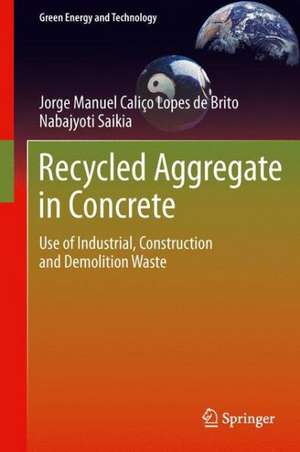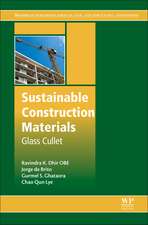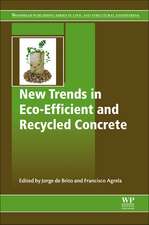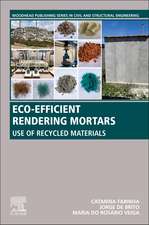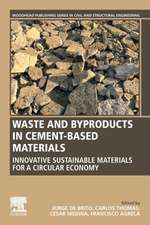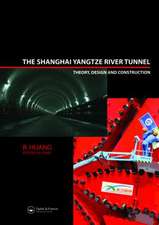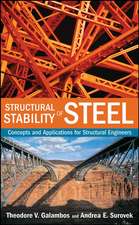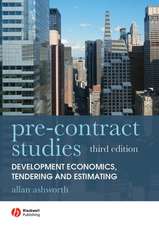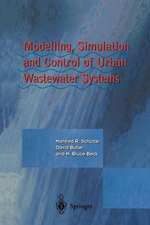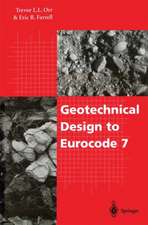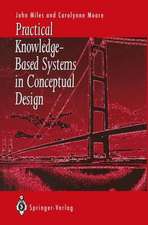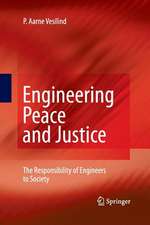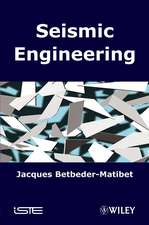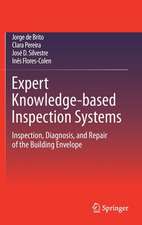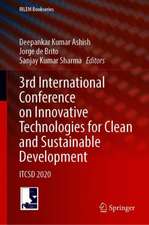Recycled Aggregate in Concrete: Use of Industrial, Construction and Demolition Waste: Green Energy and Technology
Autor Jorge de Brito, Nabajyoti Saikiaen Limba Engleză Hardback – 21 noi 2012
By drawing together information and data from various fields and sources, Recycled Aggregate in Concrete: Use of Industrial, Construction and Demolition Waste provides full coverage of this subject. Divided into two parts, a compilation of varied literature data related to the use of various types of industrial waste as aggregates in concrete is followed by a discussion of the use of construction and demolition waste as aggregate in concrete. The properties of the aggregates and their effect on various concrete properties are presented, and the quantitative procedure to estimate the properties of concrete containing construction and demolition waste as aggregates is explained. Current codes and practices developed in various countries to use construction and demolition waste as aggregates in concrete and issues related to the sustainability of cement and concrete production are also discussed.
The comprehensive information presented in Recycled Aggregate in Concrete: Use of Industrial, Construction and Demolition Waste will be helpful to graduate students, researchers and concrete technologists. The collected data will also be an essential reference for practicing engineers who face problems concerning the use of these materials in concrete production.
| Toate formatele și edițiile | Preț | Express |
|---|---|---|
| Paperback (1) | 952.26 lei 6-8 săpt. | |
| SPRINGER LONDON – 14 dec 2014 | 952.26 lei 6-8 săpt. | |
| Hardback (1) | 956.81 lei 6-8 săpt. | |
| SPRINGER LONDON – 21 noi 2012 | 956.81 lei 6-8 săpt. |
Din seria Green Energy and Technology
- 18%
 Preț: 943.43 lei
Preț: 943.43 lei - 20%
 Preț: 629.52 lei
Preț: 629.52 lei - 18%
 Preț: 1124.92 lei
Preț: 1124.92 lei - 18%
 Preț: 947.35 lei
Preț: 947.35 lei - 15%
 Preț: 655.92 lei
Preț: 655.92 lei - 18%
 Preț: 957.62 lei
Preț: 957.62 lei - 18%
 Preț: 789.52 lei
Preț: 789.52 lei - 17%
 Preț: 464.56 lei
Preț: 464.56 lei - 15%
 Preț: 645.79 lei
Preț: 645.79 lei - 18%
 Preț: 903.93 lei
Preț: 903.93 lei - 24%
 Preț: 1322.09 lei
Preț: 1322.09 lei - 18%
 Preț: 890.54 lei
Preț: 890.54 lei - 18%
 Preț: 1115.46 lei
Preț: 1115.46 lei - 18%
 Preț: 1117.03 lei
Preț: 1117.03 lei - 18%
 Preț: 949.73 lei
Preț: 949.73 lei - 18%
 Preț: 892.11 lei
Preț: 892.11 lei - 15%
 Preț: 648.24 lei
Preț: 648.24 lei - 18%
 Preț: 997.09 lei
Preț: 997.09 lei - 15%
 Preț: 579.81 lei
Preț: 579.81 lei - 18%
 Preț: 1123.15 lei
Preț: 1123.15 lei - 18%
 Preț: 961.41 lei
Preț: 961.41 lei - 17%
 Preț: 490.23 lei
Preț: 490.23 lei - 18%
 Preț: 904.60 lei
Preț: 904.60 lei - 15%
 Preț: 643.34 lei
Preț: 643.34 lei -
 Preț: 287.91 lei
Preț: 287.91 lei - 24%
 Preț: 634.05 lei
Preț: 634.05 lei -
 Preț: 379.40 lei
Preț: 379.40 lei - 18%
 Preț: 783.20 lei
Preț: 783.20 lei - 18%
 Preț: 956.09 lei
Preț: 956.09 lei - 18%
 Preț: 1394.84 lei
Preț: 1394.84 lei - 18%
 Preț: 1691.57 lei
Preț: 1691.57 lei - 15%
 Preț: 592.61 lei
Preț: 592.61 lei - 18%
 Preț: 952.09 lei
Preț: 952.09 lei - 18%
 Preț: 944.19 lei
Preț: 944.19 lei - 18%
 Preț: 891.33 lei
Preț: 891.33 lei - 18%
 Preț: 1252.44 lei
Preț: 1252.44 lei - 18%
 Preț: 789.52 lei
Preț: 789.52 lei - 20%
 Preț: 566.30 lei
Preț: 566.30 lei - 18%
 Preț: 1112.48 lei
Preț: 1112.48 lei - 18%
 Preț: 1114.24 lei
Preț: 1114.24 lei - 18%
 Preț: 1113.71 lei
Preț: 1113.71 lei - 18%
 Preț: 1011.45 lei
Preț: 1011.45 lei - 24%
 Preț: 590.60 lei
Preț: 590.60 lei - 20%
 Preț: 567.50 lei
Preț: 567.50 lei - 24%
 Preț: 907.50 lei
Preț: 907.50 lei - 18%
 Preț: 952.89 lei
Preț: 952.89 lei
Preț: 956.81 lei
Preț vechi: 1166.84 lei
-18% Nou
Puncte Express: 1435
Preț estimativ în valută:
183.11€ • 198.83$ • 153.81£
183.11€ • 198.83$ • 153.81£
Carte tipărită la comandă
Livrare economică 22 aprilie-06 mai
Preluare comenzi: 021 569.72.76
Specificații
ISBN-13: 9781447145394
ISBN-10: 1447145399
Pagini: 460
Ilustrații: XII, 448 p.
Dimensiuni: 155 x 235 x 30 mm
Greutate: 0.77 kg
Ediția:2013
Editura: SPRINGER LONDON
Colecția Springer
Seria Green Energy and Technology
Locul publicării:London, United Kingdom
ISBN-10: 1447145399
Pagini: 460
Ilustrații: XII, 448 p.
Dimensiuni: 155 x 235 x 30 mm
Greutate: 0.77 kg
Ediția:2013
Editura: SPRINGER LONDON
Colecția Springer
Seria Green Energy and Technology
Locul publicării:London, United Kingdom
Public țintă
ResearchCuprins
Preface.- 1.Sustainable Development in Concrete Production.- 2.Industrial Waste Aggregates.- 3.Construction and Demolition Waste Aggregates.- 4.Use of Industrial Waste as Aggregate.- 5.Use of Construction and Demolition Waste as Aggregate.- 6.Methodologies for Estimating Properties of Concrete Containing.- 7.Concrete with Recycled Aggregates in International Codes.
Notă biografică
Jorge de Brito is a Full Professor at the Civil Engineering, Architecture and Georesources Department of Instituto Superior Técnico, Technical University of Lisbon, Portugal. He was also the Head of the ICIST Research Unit in two consecutive terms between 2009 and 2012. One of his main research fields is the use of recycled aggregates in mortar and concrete production, within the Sustainable Construction general framework. He has co-authored several book chapters, around 40 ISI papers and many other publications on this specific field. His supervision experience comprises several Post-Doc scholarships, around 25 PhD’s and more than a 100 Masters. He has participated in 15 research programs (4 international), two of which as Principal investigator concerning the use of recycled aggregates in concrete. He is a member of the following international scientific commissions: W80 (CIB) / 100-TSL (RILEM); W86 (CIB); W115 (CIB). He is a frequent contributor to international journals both as an author (with 100 plus published papers) and as a reviewer (in 50 different journals).
Dr. Nabajyoti Saikia is working at Kaziranga University, Jorhat, (India). He obtained a Ph. D. degree in chemistry (material science) from Dibrugarh University (India) in 2003. His research interest includes the solid waste management, chemistry of cement and allied materials, environmental chemistry and concrete science. He has published more than 50 numbers of research articles in various refereed journals, conference proceedings and in book as a book-chapter.
Dr. Nabajyoti Saikia is working at Kaziranga University, Jorhat, (India). He obtained a Ph. D. degree in chemistry (material science) from Dibrugarh University (India) in 2003. His research interest includes the solid waste management, chemistry of cement and allied materials, environmental chemistry and concrete science. He has published more than 50 numbers of research articles in various refereed journals, conference proceedings and in book as a book-chapter.
Textul de pe ultima copertă
Concrete has become the most used man-made material in the world since its invention. The widespread use of this material has led to continuous developments such as ultra-high strength concrete and self-compacting concrete. Recycled Aggregate in Concrete: Use of Industrial, Construction and Demolition Waste focuses on the recent developments in which the use of various types of recycled waste materials as aggregate in the production of various types of concrete.
By drawing together information and data from various fields and sources, Recycled Aggregate in Concrete: Use of Industrial, Construction and Demolition Waste provides full coverage of this subject. Divided into two parts, a compilation of varied literature data related to the use of various types of industrial waste as aggregates in concrete is followed by a discussion of the use of construction and demolition waste as aggregate in concrete. The properties of the aggregates and their effect on various concrete properties are presented, and the quantitative procedure to estimate the properties of concrete containing construction and demolition waste as aggregates is explained. Current codes and practices developed in various countries to use construction and demolition waste as aggregates in concrete and issues related to the sustainability of cement and concrete production are also discussed.
The comprehensive information presented in Recycled Aggregate in Concrete: Use of Industrial, Construction and Demolition Waste will be helpful to graduate students, researchers and concrete technologists. The collected data will also be an essential reference for practicing engineers who face problems concerning the use of these materials in concrete production.
By drawing together information and data from various fields and sources, Recycled Aggregate in Concrete: Use of Industrial, Construction and Demolition Waste provides full coverage of this subject. Divided into two parts, a compilation of varied literature data related to the use of various types of industrial waste as aggregates in concrete is followed by a discussion of the use of construction and demolition waste as aggregate in concrete. The properties of the aggregates and their effect on various concrete properties are presented, and the quantitative procedure to estimate the properties of concrete containing construction and demolition waste as aggregates is explained. Current codes and practices developed in various countries to use construction and demolition waste as aggregates in concrete and issues related to the sustainability of cement and concrete production are also discussed.
The comprehensive information presented in Recycled Aggregate in Concrete: Use of Industrial, Construction and Demolition Waste will be helpful to graduate students, researchers and concrete technologists. The collected data will also be an essential reference for practicing engineers who face problems concerning the use of these materials in concrete production.
Caracteristici
Proposes a new approach to the prediction of the long-term properties of concrete with recycled aggregate Compiles scattered data on the use of recycled aggregate in concrete production in a single volume Includes numerous illustrations Includes supplementary material: sn.pub/extras
